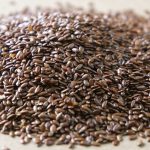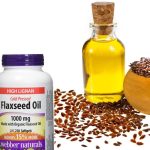What Does Flaxseed Do For The Female Body?

Flaxseed, also known as linseed, is a small, brown, or golden seed derived from the flax plant (Linum usitatissimum). It has a rich history dating back thousands of years and has been used for various purposes, including as a food source, textile material, and medicinal ingredient. Here’s a brief overview of flaxseed and its history:
Flax cultivation can be traced back to ancient civilizations such as Mesopotamia, Egypt, and China. The Egyptians valued flaxseed for its fiber and used it to produce linen textiles. Additionally, they recognized its nutritional benefits and incorporated it into their diet. Flaxseed has gained popularity due to its high nutritional value. It is rich in dietary fiber, omega-3 fatty acids (specifically alpha-linolenic acid), lignans, and various vitamins and minerals. These nutritional properties have led to the recognition of flaxseed as a functional food that promotes health and well-being.
Traditional medicine systems, including Ayurveda and Traditional Chinese Medicine, have utilized flaxseed for centuries. It was believed to possess medicinal properties and was used to treat various ailments such as digestive disorders, skin conditions, and respiratory issues. Flaxseed has been consumed as food for thousands of years. Ancient Greek philosopher Hippocrates mentioned its medicinal properties, and in Roman times, flaxseed was considered a staple food. It was commonly used in baking and cooking, particularly in flatbreads and porridge.
In recent years, flaxseed has experienced a resurgence in popularity due to its health benefits. Its high omega-3 fatty acid content, lignans (antioxidant compounds), and fiber have attracted attention as potential contributors to heart health, reduced inflammation, and improved digestion. In this article, we will be taking a close look at the effects of flaxseed on the female body.
What does flaxseed do for the female body?
Flaxseed can have several potential benefits for the female body due to its nutrient composition and bioactive compounds. Here are some ways flaxseed may positively impact women’s health:
1. Hormonal balance: Flaxseed contains lignans, which are plant compounds that possess weak estrogenic properties. These lignans can bind to estrogen receptors in the body and help regulate hormone levels. By exerting a modulating effect on estrogen activity, flaxseed may help balance hormone levels in women. This can be particularly beneficial during times of hormonal fluctuation, such as menopause or the menstrual cycle.
2. Menopause symptom relief: Menopause is characterized by a decline in estrogen levels, leading to symptoms like hot flashes, night sweats, and mood swings. The lignans in flaxseed have been studied for their potential to alleviate these symptoms. Some research suggests that flaxseed’s phytoestrogens can provide a mild estrogenic effect, helping to alleviate menopausal discomfort.
3. Breast health: Flaxseed is rich in lignans, and several studies have explored their potential protective effects against breast cancer. Lignans may help inhibit tumor growth and reduce the activity of oncogenes like HER2 (c-erB2) associated with breast cancer development. Furthermore, flaxseed consumption has been associated with a reduction in breast cancer risk, particularly in postmenopausal women.
4. Heart health: Flaxseed is an excellent source of omega-3 fatty acids, specifically alpha-linolenic acid (ALA). These omega-3 fatty acids have been extensively studied for their cardiovascular benefits. They can help reduce inflammation in blood vessels, improve cholesterol levels (specifically by lowering LDL cholesterol and triglycerides), lower blood pressure, and enhance overall heart health. Regular consumption of flaxseed may contribute to a reduced risk of heart disease and related complications.
5. Digestive health: Flaxseed is rich in dietary fiber, including both soluble and insoluble fiber. This fiber content supports healthy digestion and regular bowel movements. Soluble fiber can help soften stools and promote their smooth passage, reducing the risk of constipation. Insoluble fiber adds bulk to the stool, facilitating its movement through the digestive tract. Flaxseed’s fiber content can also act as a prebiotic, promoting the growth of beneficial gut bacteria and supporting a healthy gut microbiome.
6. Skin health: The omega-3 fatty acids found in flaxseed, particularly ALA, offer potential benefits for skin health. These fatty acids have anti-inflammatory properties that can help reduce skin inflammation and irritation. They also play a role in maintaining the skin’s barrier function and improving hydration, leading to smoother and more supple skin. While more research is needed, some studies suggest that flaxseed oil or dietary flaxseed may contribute to healthier skin.
It’s important to remember that individual responses to flaxseed may vary, and these potential benefits are based on scientific studies and observations. Flaxseed should be consumed as part of a balanced diet and lifestyle, and it is always advisable to consult with a healthcare professional for personalized advice and recommendations, especially if you have specific health concerns or are taking medications.
Can I take flaxseed for PCOS?
Flaxseed has been studied for its potential benefits in managing polycystic ovary syndrome (PCOS), a hormonal disorder that affects women of reproductive age. While more research is needed to fully understand its effects on PCOS, flaxseed has shown promise in several aspects related to the condition.
Flaxseed contains lignans which may help balance hormone levels in women with PCOS, as the condition is characterized by hormonal imbalances, including excess androgen levels. Flaxseed lignans have been shown to bind to estrogen receptors and may have anti-androgenic effects, potentially reducing the symptoms associated with PCOS.
Insulin resistance is a common feature of PCOS, leading to elevated insulin levels in the blood. Flaxseed has been found to improve insulin sensitivity and lower insulin levels in studies conducted on women with PCOS. This could be beneficial for managing the metabolic aspects of the condition, such as weight gain and glucose control.
In addition, PCOS is associated with chronic low-grade inflammation and increased oxidative stress. Flaxseed is rich in omega-3 fatty acids, which have anti-inflammatory properties and may help reduce inflammation in women with PCOS. Additionally, flaxseed’s antioxidant content may help counteract oxidative stress.
Many women with PCOS struggle with weight management due to the metabolic challenges associated with the condition. Flaxseed is high in dietary fiber, which can promote feelings of fullness and aid in weight management. By adding flaxseed to the diet, individuals with PCOS may experience improved satiety, potentially leading to reduced calorie intake and weight loss.
It’s important to note that while flaxseed may offer potential benefits for managing PCOS symptoms, it is not a standalone treatment. PCOS is a complex condition that requires a comprehensive approach involving lifestyle changes, dietary modifications, and, in some cases, medical intervention. If you have PCOS, it is advisable to consult with a healthcare professional or a registered dietitian who can provide personalized recommendations and guidance on incorporating flaxseed or any other dietary changes into your management plan.
Can flaxseed help with ovulation and pregnancy?
Flaxseed may have some potential benefits in relation to ovulation and pregnancy. Ovulation is a crucial process for achieving pregnancy, and any factors that promote regular ovulation can be beneficial. Some studies suggest that flaxseed consumption may help regulate the menstrual cycle and promote ovulation in women with irregular cycles. The lignans found in flaxseed have been associated with potential hormonal balancing effects, which could contribute to regular ovulation. However, more research is needed to fully understand the mechanisms and effectiveness of flaxseed in promoting ovulation.
The role of flaxseed in improving fertility and enhancing the chances of conception is not yet well-established. While some animal studies have shown positive effects of flaxseed on fertility parameters, such as the increased number and quality of eggs, there is limited research specifically conducted on humans. Additionally, fertility is a complex issue influenced by multiple factors, and flaxseed alone may not be sufficient to address underlying fertility challenges.
Flaxseed is a good source of omega-3 fatty acids, which are essential for fetal development and overall maternal health during pregnancy. Omega-3 fatty acids play a crucial role in brain and eye development in the fetus. Including flaxseed in the diet can help increase omega-3 intake, especially for those who follow plant-based or vegetarian diets. However, it’s worth noting that flaxseed contains a type of omega-3 called alpha-linolenic acid (ALA), which needs to be converted into the active forms, eicosapentaenoic acid (EPA) and docosahexaenoic acid (DHA), by the body. This conversion process is not very efficient, so direct sources of EPA and DHA, such as fish oil or algae-based supplements, maybe more reliable for meeting the increased omega-3 needs during pregnancy.
Can flaxseed cause miscarriage?
Flaxseed is generally considered safe for consumption during pregnancy and does not typically cause miscarriage when consumed in moderate amounts. In fact, flaxseed is a good source of essential nutrients, such as omega-3 fatty acids, fiber, and lignans, which can have potential health benefits for both the mother and the developing baby.
However, it’s important to note that some sources suggest that high doses of flaxseed oil or flaxseed supplements may have mild hormonal effects due to the presence of phytoestrogens, which are plant compounds that mimic estrogen in the body. These hormonal effects could potentially affect pregnancy outcomes, but the evidence is limited and inconclusive.
While it is true that research on the effects of flaxseeds during pregnancy is limited, and some sources, including the National Institutes of Health (NIH), have expressed concerns, it’s important to consider a range of perspectives.
The American College of Obstetricians and Gynecologists (ACOG) does not specifically recommend avoiding flaxseeds or flaxseed oil during pregnancy. Their guidelines focus on a balanced and varied diet that includes a wide range of nutritious foods, including plant-based sources of omega-3 fatty acids like flaxseeds.
Given the conflicting information, it’s essential to consult with your healthcare provider or a qualified nutritionist who can consider your individual circumstances and medical history. They will provide you with the most appropriate advice based on the latest research and guidelines.
Can flaxseed reduce breast size?
There is no scientific evidence to suggest that flaxseed can reduce breast size. Breast size is primarily determined by factors such as genetics, hormone levels, body weight, and overall body composition. Flaxseed, on the other hand, is commonly known for its potential health benefits due to its high content of omega-3 fatty acids, fiber, and lignans.
While flaxseed may have certain effects on hormones due to its phytoestrogen content, these effects are generally considered mild and unlikely to have a significant impact on breast size. If you have concerns about your breast size, it’s best to consult with a healthcare professional who can provide personalized advice based on your specific situation and discuss any available options or interventions.
Flaxseed Side Effects For Females
Flaxseed is generally safe for most women when consumed in moderation as part of a balanced diet. However, some individuals may experience certain side effects or have specific considerations:
1. Digestive issues: Flaxseed is high in fiber, which can cause digestive discomfort in some people, especially when consumed in large amounts or if the body is not accustomed to high-fiber intake. Common digestive side effects may include bloating, gas, abdominal discomfort, or diarrhea. It is recommended to start with small amounts of flaxseed and gradually increase intake while ensuring adequate fluid intake to help minimize these side effects.
2. Allergic reactions: Although rare, some individuals may have an allergic reaction to flaxseed. Symptoms of an allergic reaction may include itching, hives, swelling (particularly of the face, tongue, or throat), difficulty breathing, or digestive issues. If you experience any signs of an allergic reaction, discontinue use and seek medical attention immediately.
3. Interactions with medications: Flaxseed may interact with certain medications. It can have mild antiplatelet effects, potentially increasing the risk of bleeding when combined with blood-thinning medications like warfarin or aspirin. Additionally, flaxseed may affect the absorption or effectiveness of certain medications. If you are taking any medications, especially blood thinners or other prescription drugs, it is advisable to consult with a healthcare professional before incorporating flaxseed into your diet.
4. Hormone-sensitive conditions: Flaxseed contains phytoestrogens, which are plant compounds that can have estrogen-like effects in the body. While the impact of flaxseed on hormone-sensitive conditions such as estrogen receptor-positive breast cancer or endometriosis is not yet fully understood, it is recommended to consult with a healthcare professional before incorporating flaxseed into the diet if you have these conditions.
5. Pregnancy and breastfeeding: Flaxseed is generally considered safe during pregnancy and breastfeeding when consumed in moderation as part of a well-rounded diet. However, it is recommended to consult with a healthcare professional for personalized advice, as they can provide guidance based on individual circumstances.
As with any dietary change or supplementation, it’s important to listen to your body and be aware of any changes or adverse effects. If you experience any persistent or concerning side effects after consuming flaxseed, it is advisable to discontinue its use and consult with a healthcare professional for further evaluation and guidance.





